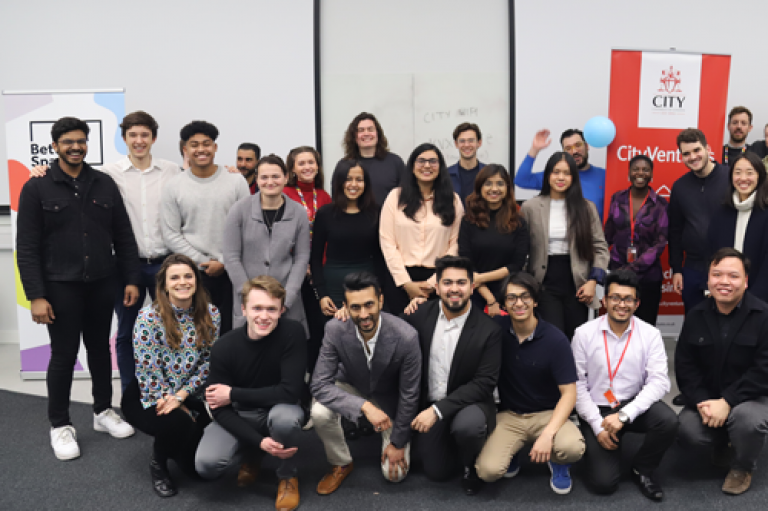Students and staff join first of weekly beekeeping sessions
By Eve Lacroix (Senior Communications Officer), Published
“My father kept bees when I was younger. I was petrified then,” says Barnaby Shaw, City’s beekeeper. “In my twenties, I helped out on an urban farm which had an apiary and from there, my curiosity about nature, greening and bees evolved into a career.”
Now, he has been beekeeping for twenty years. In 2013, he launched the social enterprise Bee Urban, which coordinates urban beekeeping, horticulture and community growing. Through this enterprise, he became City’s official beekeeper.

Urban beekeeping at City
Ahead of World Bee Day this Saturday 20 May, the Sustainability Team at City, University of London restarted their weekly beekeeping sessions for both students and staff.
To prepare for this, last week Barnaby introduced a new colony of honeybees to the hive, which is hosted on the roof of the University’s Tait Building.
Barnaby visits City’s hive on a weekly basis to do inspections of the colony, ensuring the bees are healthy, that they have enough food reserves and that their queen bee is happy and laying eggs. He hopes that, by July, his team will be able to harvest honey.
During the first session, Barnaby pointed out where the queen bee was and how to recognise drones, which are male bees who do not have stingers— they have stouter and longer bodies and bigger eyes.
He also pointed out what ripe honey looks like. The hive is separated into ‘honey super frames’, which are removable frames filled with wax in which the honeybees collect, store and ripen nectar. When the honey is ripe, these frames have a white film over them, meaning they are full or ‘capped’.

Ashley Palmer, who works in City’s regulation and compliance team, attended the session for the first time.
“The beekeeping sessions show a real commitment from City to sustainability,” says Ashley. “It was a both an interesting and an informative session – I learned more about the structure of the hive, the different types of bees and their life cycle.”
The sessions were organised by Arthur Shearlaw, Sustainability Engagement Coordinator at City.
“The beekeeping sessions are a fun environment in which people can learn something new about biodiversity,” says Arthur.

Supporting biodiversity on an urban campus
While honeybees are important pollinators, which are essential to helping flowering plants grow much of our food, there are many other species of pollinators and tools that can be used to support urban greening and biodiversity.
“City is a very urban campus but we make sure to use our green spaces as much as possible,” says Arthur.
He coordinates gardening sessions in the Walled Garden, which is an edible community garden full of fruits, vegetables, herbs and edible flowers that sits between the Drysdale Building and the University Building.
Arthur also cited the importance of campaigns such as ‘No Mow May’: this campaign encourages all owners of green spaces to allow parks, lawns and green patches to grow freely. This helps wild plants grow and feed bees, butterflies and other pollinators throughout the summer.
Having a diverse mix of plants and planting throughout the year— such as planting bulbs in the winter– is another tool to promote biodiversity.
“Having people get involved in looking after something else through gardening or beekeeping is a great way of getting them more interested in biodiversity and sustainability more widely,” he says.
Sustainability at City
During term time, Arthur runs monthly sustainability workshops, coordinates the annual London Student Sustainability Conference, and helps deliver initiatives such as the Sustainable City Hackathon, Global Goals Week and Fairtrade Fortnight.
Thanks to projects such as the Walled Garden and its urban hive, City is a full member of the Environmental Association of Universities and Colleges (EAUC), the primary network for sharing expertise in environmental issues in higher education nationally.
Sustainability is a key part of City’s strategy and the University aims to live its values through action.
In 2022 was ranked 44th in the UK for its sustainability initiatives in the People and Planet University League. City has also made the commitment to achieve net zero carbon emissions by 2040, at the latest.
Get involved in City’s sustainability volunteering, beekeeping or gardening.



